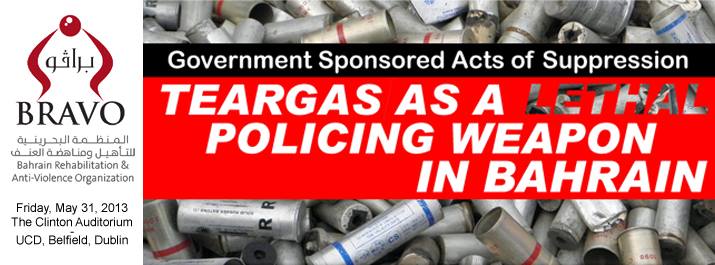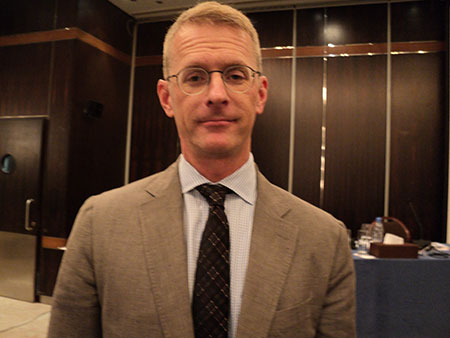
Dr. Sollom: Bahrain Living 900 Days With Tear Gas!
Rahil Merhi
Dr. Richard Sollom, Director of "Emergencies and Special Initiatives with Physicians for Human Rights": "I only experienced it once; whereas the rest of the Bahrainis have experienced it every day for the past 900 days!"
Among the researchers lecturing at the "Conference on Tear Gas: Silent Killing in Bahrain", which was held at the "Crowne Plaza" in Hamra, Beirut on July 3rd, 2013, was Dr. Richard Sollom, Director of "Emergencies and Special initiatives with Physicians for Human Rights".
 A human rights activist over 15 years, Dr. Sollom is an expert in international human rights. He has been in over 20 countries in Africa and the Middle East. The American researcher as well holds a Ph.D. in Political Science among other certificates and is a lecturer at "Harvard University" in Massachusetts, US.
A human rights activist over 15 years, Dr. Sollom is an expert in international human rights. He has been in over 20 countries in Africa and the Middle East. The American researcher as well holds a Ph.D. in Political Science among other certificates and is a lecturer at "Harvard University" in Massachusetts, US.
Dr. Sollom's lecture was entitled "Weaponizing Tear Gas: Bahrain's Unprecedented Use of chemical Agents against Civilians".
"It's wonderful to be here today," expressed Dr. Sollom, addressing special thanks to the conference organizers. He also said he was glad that Bahrain was getting this attention from Beirut.
"I became familiar with Bahrain 3 years ago. It's like a second home to me. During the beginning of the "Arab Spring", I became interested in the developments occurring in Bahrain and got introduced to Dr. Nada Dhaif [Chairperson of Bravo (Bahrain Rehabilitation and Anti-Violence
Organization)] and 50 other medical staff," he told the activists, journalists, medical staff, and senior figures attending the conference.
"The Bahraini forces are violating human rights' standards and people's right to a life free from torture," Dr. Sollom explained, "They're attacking medical transport ambulances, peaceful protestors, and even the wounded!"
Showing a sense of humor, the American activist said, "I am usually teased by my colleagues for being "kicked out" of Bahrain. They always say I must have done great things there!" However, the doctor said he was maintaining his support to the Bahraini people, "I am still working with Physicians for Human Rights".
 Based on interviews conducted, patients examined, X-rays analyzed, and videos watched by Dr. Sollom, the lecture focused on the way the Bahraini regime had weaponized tear gas (CS gas) and violated the UN principles on the use of force and the human rights law. He recalled the Bahraini forces' unlawful entry into houses, how they stormed the village of Sitra while he was there, stating, "Over 80% of the Shia communities are getting attacked by policemen more than once a week!"
Based on interviews conducted, patients examined, X-rays analyzed, and videos watched by Dr. Sollom, the lecture focused on the way the Bahraini regime had weaponized tear gas (CS gas) and violated the UN principles on the use of force and the human rights law. He recalled the Bahraini forces' unlawful entry into houses, how they stormed the village of Sitra while he was there, stating, "Over 80% of the Shia communities are getting attacked by policemen more than once a week!"
He said that 99% of the Bahraini protestors were peaceful and that the government had failed to use dialogue, de-escalate violence, and minimize harm, "Can you imagine what it's like to turn grenades into missiles launched at only 15 feet away?!"
"I've spoken to people who've been shot," he recalled, "Not once have I heard a story of a wounded protestor immediately taken to hospital or clinic!"
Now Dr. Sollom detailed the various health impacts of tear gas grenades and canisters: suffocation, respiratory failure, lacerations, fractures, sickle cell disease, toxic reactions, and an increase in the number of deformed babies. "Never has a government used tear gas for such a long time against a civil population!" exclaimed Dr. Sollom.
"So little public research has been done on the effect of chemical gas," said the lecturer, who called on human rights organizations and activists to act more strongly and conduct epidemiological research. However, he said that "Bravo" and he were beginning to do that type of research.
Eventually, the confreres made their recommendations to the Organization for the Prevention of Chemical Weapons" (OPCW), the Chemical Weapons Convention (CWC), the Bahraini government, and the international community in hopes of ending the Bahrainis' sufferance and addressing their health life.
"Al-Ahed News" interviewed Dr. Sollom. Here below is the interview:
Q:While lecturing, you recalled the story when the Bahraini police forces stormed the village of Sitra in Bahrain, launching tear gas grenades. Tell us about it.
Sitra is a predominantly Shia neighborhood in Manama. It has a population of about 50,000 people. It's almost like an island, and it's very separated from the other communities. There are bridges going into the community, so it's very easy to isolate it.

There were 15 peaceful protestors or so, and none was armed. None was carrying a "Molotov cocktail" [an incendiary bomb]. It was a highly densely populated region.
I, among the others, was exposed to tear gas for the first time in my life, and I definitely felt the suffocation feeling and the burning in the nose and throat!
You absolutely want to run away. It's not that you have difficulty breathing; it's that you cannot breathe. You have to run away.
It's a terrible experience, but I only experienced it once; whereas the rest of the Bahrainis have experienced it every day for the past 900 days!
Q:Did the government actually know you had come to Bahrain to do that? And did they easily allow researchers in?
No, if they knew, they would have never allowed us to do that. It was my first occasion to be in Bahrain, and that was in 2011. The government did not know I was there because I was not a known person. I was examining the medical neutrality of the Bahrain government as well as their use of tear gas.
Because of international pressure; in 2012, the international community was focusing more strongly on Bahrain. They kind of allowed in ‘selectively' certain bodies for investigation and research, the "Bahrain Independent Commission of Inquiry" (BICI), and perhaps last year they were more willing to allow in selected groups of human rights organizations; but ever since I was not allowed in again.
Q:During your presentation, you said little scientific research on the impacts of the massive amounts of tear gas used in crackdowns in Bahrain had been done. You also called on research teams and organizations to do more research. Which parties do you think must act?
Well, in order to do longitudinal studies and proper epidemical research, you need to do it transparently and to be doing it openly.
 You can't do this secretly or covertly. You need the permission of the government, specifically the Ministry of Health in Bahrain, which should be doing its own epidemiologic studies.
You can't do this secretly or covertly. You need the permission of the government, specifically the Ministry of Health in Bahrain, which should be doing its own epidemiologic studies. You need to do surveys and researching and to randomly select people in the population. It takes many months. You can't do this secretly, so you need the permission of the government.
Knowing the health effects that tear gas is imposing upon this population, the government should convince itself to stop using tear gas.
Q:What do you think the outcomes of your efforts will be?
Well, we're hoping that the Bahrain government will finally realize that what they are doing against their civilian population are severe human rights violations, and we hope that the global awareness will rise and people will understand what is going on in this small Gulf kingdom.
Q:Amid the violence, economic and military crises around the world, do you think awareness can still be raised?
Yes, of course there is violence, also human rights violations in many countries. But I think what makes the Bahrain case so interesting and compelling to look at is because it's the first time in history the government has unleashed so much toxic chemical agents against the population. I believe if the international community really understood the harm that is done by tear gas, they would pay more attention to the Bahrain case.
Q:Do you have a last word to our readers?
Yes, and that is to understand more about tear gas and to pay attention to what is happening in small countries like Bahrain. Bahrain is in the Gulf, so it's in your neighborhood. Other Gulf and Middle East countries must pay attention not only to the atrocities being committed in major countries, but also to the small kingdom of Bahrain.
Source: Al-Ahed news



